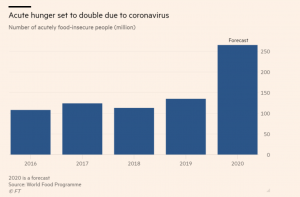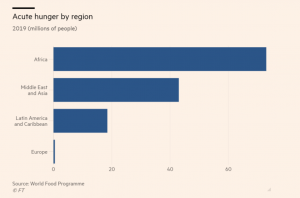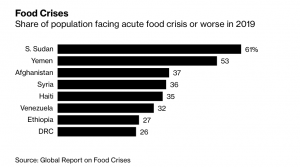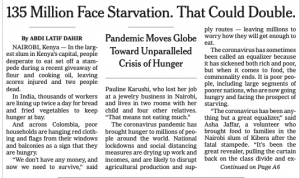Bloomberg's Hallie Gu reported that "China’s grain supply won’t be affected by a loss of US feed grain and oilseed imports, thanks to abundantly available substitutes on the global market…
UN’s World Food Programme: COVID-19 Could Almost Double Acute Hunger
The Financial Times reported this week that, “Governments and international institutions are becoming increasingly worried about the growing constraints on access to food around the world as coronavirus disrupts economies and leaves workers without income for sustenance.
“While global stocks of staples including grains and pulses are deemed to be sufficient, supply chains are coming under pressure and workers in developing countries with little in the way of a financial cushion are losing out on earnings.
“Agriculture ministers from the G20 group of major developed and developing economies held a virtual meeting on Tuesday to discuss the situation. Experts warn hunger and discontent could drive a fresh wave of mass migration towards wealthier countries.”
The FT article stated that,
In a statement after the meeting the ministers said they had agreed to ‘guard against any unjustified restrictive measures that could lead to excessive food price volatility in international markets and threaten the food security and nutrition of large proportions of the world population.’
“Any measures taken by governments to limit the spread of the pandemic must ‘be targeted, proportionate, transparent, and temporary, and . . . do not create unnecessary barriers to trade or disruption to global food supply chains,’ they said, calling for ‘enhanced co-operation between the public and private sectors to help mobilise rapid and innovative responses to impacts of this pandemic on the agriculture and food sectors.'”

The FT article added that, “The UN’s World Food Programme warned on Tuesday that the number of people facing acute food insecurity could double in 2020 from the year before, to 265m. The pandemic and lockdown measures combined with rising unemployment and limited access to food could lead to violence and conflict, the WFP warned.”

And Bloomberg writer Agnieszka de Sousa reported this week that, “The threat of social and political unrest around the world is rising as the coronavirus crisis fuels discontent amid food shortages, job losses and lockdowns.
“That may particularly impact nations that are already battling food crises, according to a report from 16 organizations including United Nations agencies and the European Union. The number of people facing acute food insecurity will almost double this year to 265 million unless swift action is taken, the UN’s World Food Programme warned separately.”
The Bloomberg article explained that, “Increased unemployment is curbing incomes available for food, while supply-chain disruptions are starting to impact food security in many parts of the world, boosting prices of key staples such as wheat and rice. Several governments have restricted some food exports to safeguard domestic supplies recently, and the UN has urged countries to avoid ‘beggar-thy-neighbor policies‘ seen during a global food price crisis a decade ago.”

Abdi Latif Dahir reported on the front page of Thursday’s New York Times that, “The coronavirus pandemic has brought hunger to millions of people around the world. National lockdowns and social distancing measures are drying up work and incomes, and are likely to disrupt agricultural production and supply routes — leaving millions to worry how they will get enough to eat.
“The coronavirus has sometimes been called an equalizer because it has sickened both rich and poor, but when it comes to food, the commonality ends. It is poor people, including large segments of poorer nations, who are now going hungry and facing the prospect of starving.”

The Times article stated that, “Already, 135 million people had been facing acute food shortages, but now with the pandemic, 130 million more could go hungry in 2020, said Arif Husain, chief economist at the World Food Program, a United Nations agency. Altogether, an estimated 265 million people could be pushed to the brink of starvation by year’s end.”
Reuters News reported this week that, “Agriculture and food ministers from the Group of 20 countries agreed at a virtual meeting on Tuesday that emergency measures to stop the spread of the new coronavirus must not upend global food supply chains.
“Their extraordinary meeting came as coronavirus lockdowns across the world slow global food supply chains, leaving some farmers unable to get their produce to consumers and major producing countries restricting exports.”
A senior World Bank official, Mari Pangestu, also warned at Tuesday’s meeting against import barriers and export restrictions, urging global cooperation to avert food crises.
Also this week, Bloomberg writer Bryce Baschuk reported that, “Some of the world’s largest agricultural exporters are growing concerned that the coronavirus pandemic has caused a worrisome rash of government policies that threaten to disrupt the global supply of food.
“In order to prevent a food crisis, a group of nearly 50 governments is preparing to sign a pledge aimed at ensuring supply chains remain orderly and that officials exercise restraint with any trade restrictions.”
The Bloomberg article pointed out that, “Participants in the agreement include: the EU, Japan, Brazil, Canada, Australia, Mexico, South Korea, New Zealand, the U.K., Switzerland, Qatar, Chile, Costa Rica, Colombia, the Philippines, Hong Kong, Malawi, Singapore, Ukraine, Paraguay and Uruguay.
“As of Tuesday afternoon, the U.S., China, India and Russia had not signed on to the initiative.
“Though the measures are non-binding, the pact is viewed as an important initiative aimed at making sure the health crisis doesn’t spawn a food emergency.”





